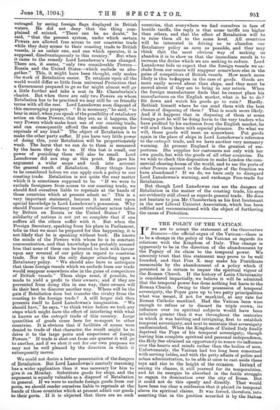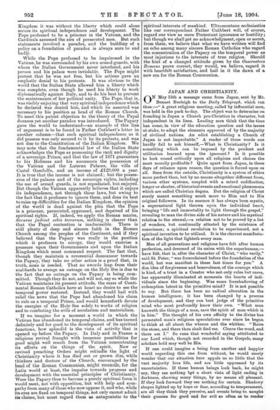I F we are to accept the statement of the Osservatore
Romano—the official organ of the Vatican—there is to be a change in the policy of the Vatican as regards its relations with the Kingdom of Italy. This change is apparently to be in the direction of the abandonment by the Papacy of its claim to the temporal power. We sincerely trust that this statement may prove to be well founded, and that Pius X. may make his Pontificate memorable by the abandonment of a policy which if persisted in is certain to impair the spiritual vigour of the Roman Church. If the history of Latin Christianity is considered impartially, we believe it will be admitted that the temporal power has done nothing but harm to the Roman Church. Owing to their possession of temporal sovereignty, the Popes gave up to two petty principalities what was meant, if not for mankind, at any rate for Roman Catholic mankind. Had. the Vatican been wise enough to refuse or to discard its triple crown, its influence over its spiritual subjects would have been infinitely greater than it was throughout the centuries in which it was battling and intriguing, first to establish temporal sovereignty, and next to maintain that sovereignty undiminished. When the Kingdom of United Italy finally deprived the Pope of his temporal sovereignty, though leaving him complete spiritual and personal independence, the Holy See obtained an opportunity to renew its influence over the hearts and minds rather than the bodies of men. Unfortunately, the Vatican had too long been concerned with serving tables, and with the petty affairs of police and urban administration, to be able at once to east aside these toys and rise to the height of the occasion. Instead of seizing its chance, it still yearned for its temporalities, and let its energies be absorbed in the futile struggle to regain its domination over the city of Rome. But it could not do this openly and directly. That would have been too clear a confession that it placed its temporal above its spiritual claims. It was forced, therefore, into asserting that in the position accorded it by the Italian While the Pope professed to be imprisoned in the Vatican, he was surrounded by his own armed guards, with whom the Italian Government never interfered, and his person and his palace were inviolable. The Pope might protest that he was not free, but his actions gave an emphatic denial to his protests. It was obvious to the world that the Italian State allowed him a liberty which was complete, even though he used his liberty to work diplomatically against Italy, and to do his best to prevent the maintenance of her political unity. The Pope, that is, was visibly enjoying that very spiritual independence which he declared was denied him, and which he asserted was necessary to his position as head of the Roman Church.
To meet this patent objection to the theory of the Papal durance yet another paradox was introduced. The Papacy gave the world to understand—an example of this line of argument is to be found in Father Cuthbert's letter in another column—that such spiritual independence as it did possess was only secured to it by its protests, and was not due to the Constitution of the Italian Kingdom. We may note that the fundamental law of the Italian State acknowledges the Pope as possessing the rank and dignity of a sovereign Prince, and that the law of 1871 guarantees to his Holiness and his successors the possession of the Vatican and the Lateran Palaces, the villa of Castel Gandolfo, and an income of £129,000 a year.
It is true that the income is not claimed; but the posses- sion of the palaces and of the sovereign rights, including the use of armed guards, is not repudiated, but enjoyed.
But though the 'Vatican apparently believes that it enjoys its independence, not through these laws, but owing to the fact that it professes to ignore them, and does its best to raise up difficulties for the Italian Kingdom, the opinion of the world is dead against the plea that the Pope is a prisoner, persecuted, Oppressed, and deprived of his spiritual rights. If, indeed, we apply the Roman maxim, Securus judicat orbis terrarum, nothing is clearer than that the Papal contention is inadmissible. There is still plenty of deep and sincere faith in the Roman Church among the peoples of the Continent, and if they believed that the Papacy was really in the position which it professes to occupy, they would exercise a pressure upon their Governments and upon the Italian Kingdom which must command respect. The fact that, though they maintain a reverential demeanour towards the Papacy, they take no other action is a proof that, in truth, none is needed. That no swords leap from their scabbards to avenge an outrage on the Holy See is due to the fact that no outrage on the Papacy is being com- mitted. Though they do not, and will not, say so while the Vatican maintains its present attitude, the mass of Conti- nental Roman Catholics have at heart no desire to see the temporal power restored. Instead, they would hail with relief the news that the Pope had abandoned his claim to rule as a temporal Prince, and would henceforth devote the energies of the Holy See solely to works of religion and to combating the evils of secularism and materialism.
If we imagine for a moment a world in which the Vatican has abandoned its temporal claims, and has turned definitely and for good to the development of its spiritual functions, how splendid is the vista of activity that is opened up before the Papacy. In Italy and in France a religious revival fraught with immense possibilities for good might well result from the Vatican concentrating its efforts on the things of the spirit. New or revived preaching Orders might rekindle the light of Christianity where it has died out or grown dim, while thinkers and doctors of the Church, encouraged by the head of the Roman Communion, might reconcile, for the Latin world at least, the impulse towards progress and development with the essential principles of Christianity. Were the Papacy thus to become a purely spiritual force it would meet, not with opposition, but with help and sym- pathy from many of those who now oppose it, and who, while its eyes are fixed on temporal things, not only cannot admit- its claims, but must regard them as antagonistic to the Kingdom it was without the liberty which could alone secure its spiritual independence and development. The Pope professed to be a prisoner in the Vatican, and the Cardinals assumed the airs of persecuted men. But such statements involved a paradox, and the building of a policy on a foundation of paradox is always mire to end badly. spiritual interests of mankind. Ultra.montane ecclesiastics like our correspondent Father Cuthbert will, of course, regard our view as mere Protestant ignorance or hostility; but though we shall get no acknowledgment, open or secret, from them, we believe that what we have written will find an echo among many sincere Roman Catholics who regard the concentration of the Papacy on the temporal power as most injurious to the interests of true religion. Should the hint of a changed attitude given by the Osservatore Romano prove correct, they would, we believe, regard it with heartfelt satisfaction, and hail in it the dawn of a new era for the Roman Communion.







































 Previous page
Previous page